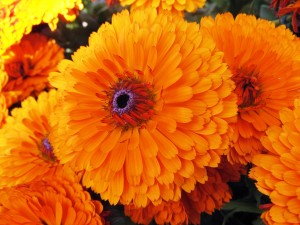Calendula officinalis (pot marigold, ruddles, common marigold, garden marigold, English marigold, or Scottish marigold) is a plant in the genus Calendula of the family Asteraceae. It is probably native to southern Europe, though its long history of cultivation makes its precise origin unknown, and it may possibly be of garden origin. It is also widely naturalised further north in Europe (north to southern England) and elsewhere in warm temperate regions of the world.
Contents
Uses
Pot marigold florets are edible. They are often used to add color to salads or added to dishes as a garnish and in lieu of saffron. The leaves are edible but are often not palatable. They have a history of use as a potherb and in salads.
Flowers were used in ancient Greek, Roman, Middle Eastern, and Indian cultures as a medicinal herb as well as a dye for fabrics, foods, and cosmetics. Many of these uses persist today. They are also used to make oil that protects the skin.
Benefits
Calendula has also been used to promote uterine contractions and it has been used to aid in the delivery of the placenta after childbirth. Additionally calendula is a common ingredient in creams used to soothe sore nipples associated with breastfeeding.
Calendula is commonly used as an herbal treatment for the relief of skin disorders. It is used to heal minor burns, including sunburns, and it is a traditional herbal remedy for the treatment of rashes, including diaper rash. This herb has also been used to treat systemic skin problems such as dermatitis, eczema, acne and psoriasis. It has even been shown to prevent dermatitis in breast cancer patients during radiation therapy, and there is evidence that it may be more effective than trolamine lotion.
Calendula has detoxifying properties. It is used to promote functioning and detoxification of the liver and gallbladder, which could be helpful to resolve some digestive problems. It has also been used to promote sweating, which helps rid the body of toxins.
This herb is sometimes used as a natural treatment for ear infections when administered as an ear drop, particularly in children.
Chronic conjunctivitis can be treated naturally with a calendula wash. The herb may reduce swelling and redness associated with this eye infection, though any treatment used on eye membranes should be sterile.
This plant has also been used as an herbal remedy to treat muscular spasms or cramps, boils, bruising, abscesses, cold sores, chronic gum disease, varicose veins, persistent dysentery, snake and scorpion bites, bee stings, light frostbite, haemorrhoids, and viral hepatitis. Its usefulness in the treatment of some cancers is also being investigated.
Cautions
Preparations of calendula flower are LIKELY SAFE for most people when taken by mouth or applied to the skin.
Special Precautions & Warnings:
Pregnancy and breast-feeding: Don’t take calendula by mouth if you are pregnant. It is LIKELY UNSAFE. There is a concern that it might cause a miscarriage. It’s best to avoid topical use as well until more is known.
There is not enough reliable information about the safety of using calendula if you are breast-feeding. Stay on the safe side and avoid use.
Allergy to ragweed and related plants: Calendula may cause an allergic reaction in people who are sensitive to the Asteraceae/Compositae family. Members of this family include ragweed, chrysanthemums, marigolds, daisies, and many others. If you have allergies, be sure to check with your healthcare provider before taking calendula.
Surgery: Calendula might cause too much drowsiness if combined with medications used during and after surgery. Stop taking calendula at least 2 weeks before a scheduled surgery.
Interactions
Sedative medications (CNS depressants) interacts with CALENDULA
Calendula might cause sleepiness and drowsiness. Medications that cause sleepiness are called sedatives. Taking calendula along with sedative medications might cause too much sleepiness.
Some sedative medications include clonazepam (Klonopin), lorazepam (Ativan), phenobarbital (Donnatal), zolpidem (Ambien), and others.
Other names
Caléndula, Calendule, English Garden Marigold, Fleur de Calendule, Fleur de Tous les Mois, Garden Marigold, Gold-Bloom, Holligold, Marigold, Marybud, Pot Marigold, Souci des Champs, Souci des Jardins, Souci des Vignes, Souci Officinal, Zergul
References
Source: Herbalsupplement, http://www.herbal-supplement-resource.com/calendula-herbs.html
Wikipedia, https://en.wikipedia.org/wiki/Calendula_officinalis#Uses

